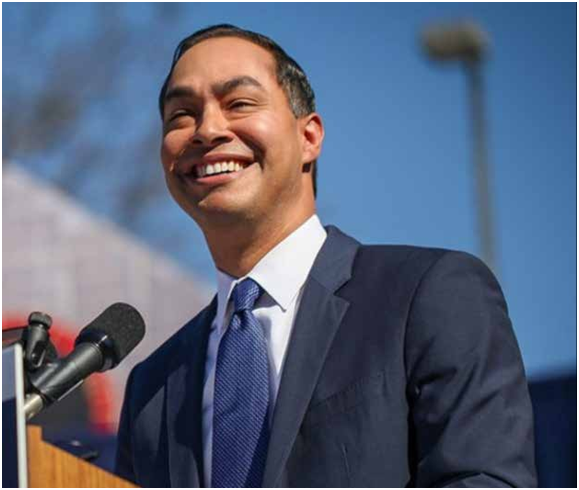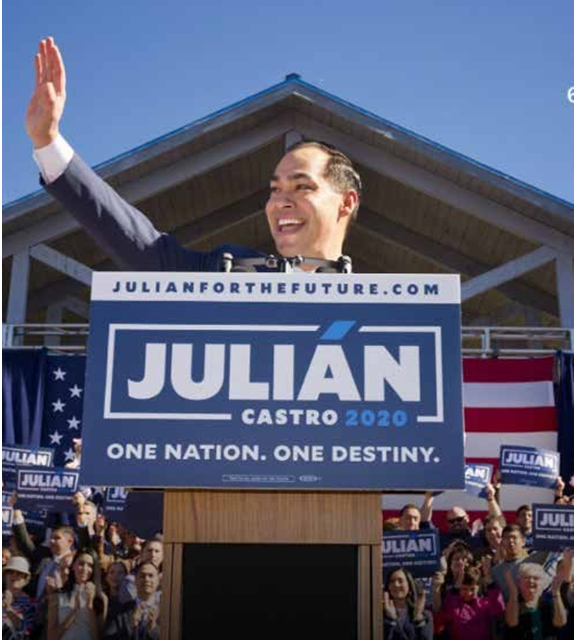By Dr. Ricardo Romo
According to most political observers, Julian Castro was the clear winner on the first night of the Democratic Party debate on June 26. The influential magazine Rolling Stone, which is popular in the United States and abroad, gave Castro an A, the only A for any candidate that eve- ning. Kamala Harris earned the only A on the second night. Rolling Stone wrote of Castro: “Showing the po- litical chops that put him in the mix for Hillary Clinton’s 2016 running-mate, Castro shined on the first night of the debate.”
Castro, the highly successful two-term mayor of San Antonio and President Barack Obama’s Housing and Urban Development secretary, was not as well known as others on the stage that night. However, INTELLIGENCER observed that Castro “ proved himself sharp, confident, well-versed in his signature issues, and willing to tell Beto O’Rourke to do his ‘homework’.”
Clearly Castro is highly qualified and his commit- ment to public service as well as his integrity, intelligence, and honesty as HUD secretary gave him a well earned national platform. The New York Times wrote that “Mr. Castro was assertive in key moments but didn’t appear desperate. He took ownership of the immigration discussion, and others on the stage willingly agreed with him. Miami’s selection to host the Democratic debate also proved ideal for Telemundo, which has of- fices on the East Coast and many viewers in Southern Florida. With a large Miami audience, candidates felt at ease with Spanish phrases.
Telemundo was also the winner. Over 15 million watched the first night of the debate, a night in which Telemundo’s Jose Diaz Balart was also making history as the first Latino to be a part of the moderators’ exclusive media team. Jose Diaz Balart is a two time Emmy Award winner and popular TV anchor for NBC Nightly News Saturday. He is well known to millions of viewers through co-hosting Telemundo Network news and entertainment shows, such as Esta Manana, and the public affairs show, Cada Dia.

Cesar Conde, the influential CEO of NBCUniversal Telemundo Enterprises, was a key figure in securing Miami as a debate site. Conde observed that the nearly 60 million Latinos in the United States are “no longer just a demographic story. They are trendsetters driving social, cultural, digital and, most importantly, economic impact.” Conde reminds us that “Latinos are without question a business imperative for growth regardless of industry or category.”
Never in the history of a U.S. presidential political debate have four individuals spoken in Spanish. Beto O’Rourke opened his re- marks in Spanish and while stumbling a bit, nonetheless made his point. Julian Castro did not say much, but the New York Times credits him with delivering the night’s best winning applause line: “And on January 20, 2021, we’ll say ‘adiós’ to Donald Trump.”
There are more Spanish speakers in the United States than Spain as well an in any other Latin American country with the exception of Mexico. The Guardian cites a study published by the prestigious Instituto Cervantes which found that there are “41 million native Spanish speakers in the US plus a further 11.6 million who are bilingual, mainly the children of Spanish- speaking immigrants.” The US Census Office is cited in the report “which estimates that the US will have 138 million Spanish speakers by 2050, making it the biggest Spanish-speaking nation on Earth, with Spanish the mother tongue of almost a third of its citizens.”
Spanish is popular in Miami, San Antonio, Los Angeles, New York, and a host of many other large cities. Like many of his schoolmates at Jefferson High School, Castro did not grow up speaking Spanish. But to his credit, Castro has been re-acquainting himself with the language of his grandparents and doing well in the process. Spanish is important to Latinos, whatever the generation, whatever the identity, and whatever the citizenship. However, it has not always been easy to keep our Spanish language, which I consider a part of my culture and heritage.
I am a third generation American, just like Julian Castro. Rosie Castro, Ju- lian Castro’s mother, and my mother share a similar story of assimilation. Like Julian Castro’s American story, my grandparents im- migrated from Mexico and spoke mainly Spanish for their entire lives. They lived in the Westside of San An- tonio where the majority of our neighbors spoke Spanish, in many cases, only Spanish. My parents were bilingual and in their work running a mom and pop grocery store in the heart of the Westside, they needed both English and Spanish. Fortunately, I grew up comfortable with both languages. But it was not easy.
My parents and I shared one same schooling experience: we were punished for speaking Spanish.
The night after the debates, I attended a church fundraiser in the Westside of San Antonio hosted by my good friends Henry and Mary Alice Cisneros. Henry asked everyone to share a story about the church and its parochial school. Some shared their stories about being married at the church 50 years earlier. Others noted that the nuns punished students (me included) who spoke Spanish. There was no bitterness, just sadness. As a result of that punishment for speaking their heritage language, our parents decided to speak only English to us. It was our grandparents that kept Spanish alive for the younger generation.
In the Miami debate set- ting, it was a night not only for speaking Spanish, a first for an American political debate, it was also a night when personal stories mattered. When asked about social justice and equal pay for women, Castro reminded the audience that he was raised by a single mother, and he understood the significance of legislative efforts to improve the lot of women and minorities.
There are many Beto supporters in Texas but few would have expected to see the sharp differences between Castro and O’Rourke on immigration. Intelligencer noted that Beto “the former congressman has refused to endorse the decriminalization of illegal border cross- ing. For the bulk of U.S. history, crossing our nation’s border without legal permission was a civil-law viola- tion, not a criminal offense. But “Title 8 of the United States Code changed that, and thereby created the legal basis for the Trump administration’s most draconian border policies, including family separation.” The New York Times observed that Castro “won the brief spar- ring match with former Rep- resentative Beto O’Rourke an old family rival” on the issue of whether we should continue to criminalize illegal border crossing.
The separation of immigrant families is a major divide between Democrats and Republicans. USA To- day commented that during the first debate “Democrats widely agreed that the fam- ily separations that have taken place under President Donald Trump’s administration’s are not in the nation’s interest and offered a variety of ideas on how to mend the humanitarian crisis at the southern U.S. border.”
On immigration, Castro had the most forceful arguments, with a plea that the Trump administration should “not criminalize desperation.” Castro added that the policies put into place over the last two years are “horrendous.” And the winners are–Castro and Telemundo. The presidential debates were indeed historic. Four candidates demonstrated with pride their ability to speak and understand Spanish. Additionally, a major Latino media corporation, Telemundo, played a significant role in reaching out to the diverse U.S. Latino population and raising issues that affect all Americans.
Photos courtesy of Ramon Chapa.









